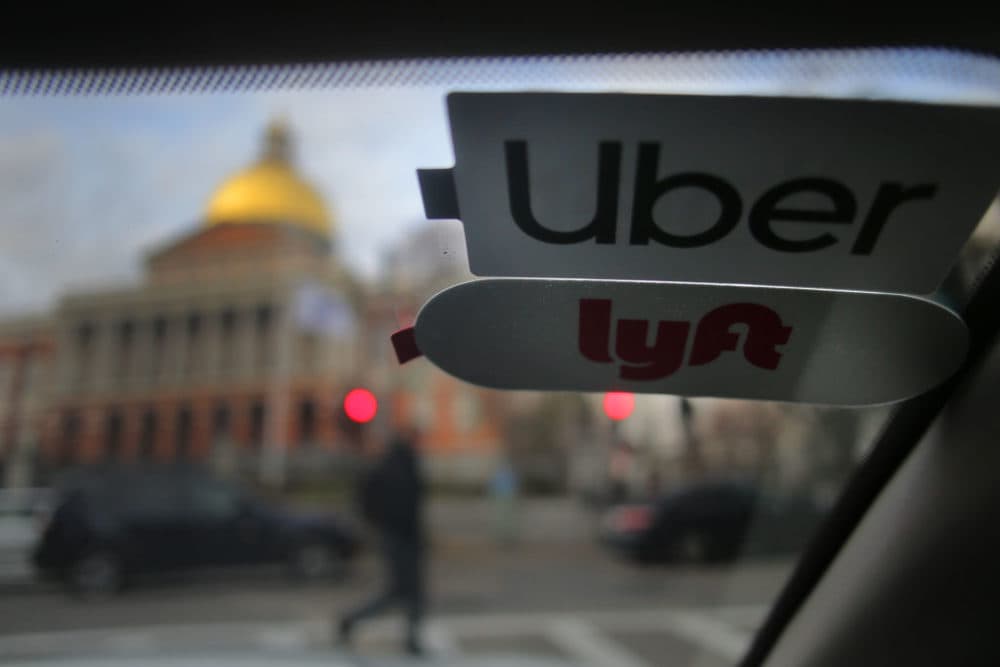Advertisement
App-based companies say drivers want to be contractors. Opponents say that strips workers' rights

Massachusetts legislators are hearing testimony Wednesday on a bill that would classify app-based workers, including ride-hail drivers, as independent contractors rather than company employees.
Supporters say the bill lets workers maintain flexible hours and establishes portable benefit accounts, but opponents say it allows the companies to pay subminimum wages and push the costs of those benefits on to its workers.
Over 3,200 drivers signed a letter in favor of the bill to be delivered to legislators, organized by Massachusetts Coalition for Independent Work. The coalition, which backs the legislation and a similar proposal that could appear on the ballot next year, is financially supported by DoorDash, Lyft, Instacart and Uber.
"Drivers like us choose app-based work because it gives us flexibility to earn extra income and also take care of our families, finish school, or work our full-time jobs," the drivers wrote in the letter. "We choose it specifically because of its independence, and we don't want to set schedules or required shifts in order to earn a little extra money."
Marcus Cole was among those who signed the letter. He has been driving for Lyft for six years, and said during a webinar held by the coalition Wednesday that legislators should listen to the needs of drivers directly.
“I want to be independent because of my families’ needs — you know, being there for my daughter and my mother and my grandmother, and dealing with tasks with them on a day-to-day basis." Cole said. "It changes all the time. So, it's very important that I keep my flexibility to keep everybody happy."
But not all drivers agree, and many were joined by legislators and labor advocates who rallied outside of the State House ahead of the hearing Wednesday morning, painting a very different picture of the bill's impacts.
Melody Cunningham, a longtime driver and single mother of five, said the apps are no longer a viable source of income for her.
"Everything falls on me. I used to be able to provide a living wage for my children," she said. "I've made hundreds of thousands of dollars for these companies with nothing to show. There is nothing paid into Social Security and there is nothing paid into anything."
State Rep. Nika Elugardo was among dozens of legislators who announced their opposition to the bill in a letter Wednesday. Elugardo said the proposal would legitimize tech companies' practices that are already being challenged on legal grounds. Under Massachusetts law, a worker is presumed to be an employee and can only be classified as a contractor under certain conditions — which she and other opponents argue the tech companies are not meeting.
Advertisement
"In Massachusetts, the cost of workers' compensation goes to the company. The cost of reimbursing employee-related expenses goes to the company. Paying into unemployment insurance goes to the company," Elugardo said. "Protecting people against discrimination is the responsibility of the company. They want to shift all of those costs to low wage workers. I mean, it's really unbelievable."
Sen. Paul Feeney called the attempts to change the worker classifications "a tale as old as time in this country."
"[Y]ou have these big tech companies like Uber and Lyft, they come in and say, 'Not only are we going to break the law. Not only are we going to do it willingly, but if we're going to continue to break the law, you know what? We'll just buy a new one. We'll just change the laws. We'll spend millions and millions of dollars to change the laws. Why? So that we can make more profits,' " he said.
Attorney General Maura Healey is suing the companies over their practices, claiming they've misclassified workers as contractors. But earlier this year she allowed a similar ballot question proposed by the app-backed Massachusetts Coalition for Independent Work to proceed on constitutional grounds.
Jonathan Paz, organizing director for Coalition to Protect Workers' Rights, cited a recent University of California Berkeley study that estimated drivers could legally earn the equivalent of as little as $4.82 per hour under the ballot proposal, when accounting for unpaid idle time, unreimbursed mileage and other factors.
"Will the future of work consist of subminimum wages and no civil rights?" Paz asked. "Will the future of work in the 21st century become a place where we have no worker protections, no Social Security and no real protections from sexism, racism and all these other -isms that we tend to fight against? Absolutely not."
Supporters would need to collect more than 80,000 voter signatures to be filed with local election officials, then pass the state Legislature or collect more than 13,000 additional signatures in order to make it on to the ballot.
Correction: An earlier version of this story included an incorrect last name for Jonathan Paz. The story has been updated. We regret the error.
This article was originally published on October 06, 2021.
